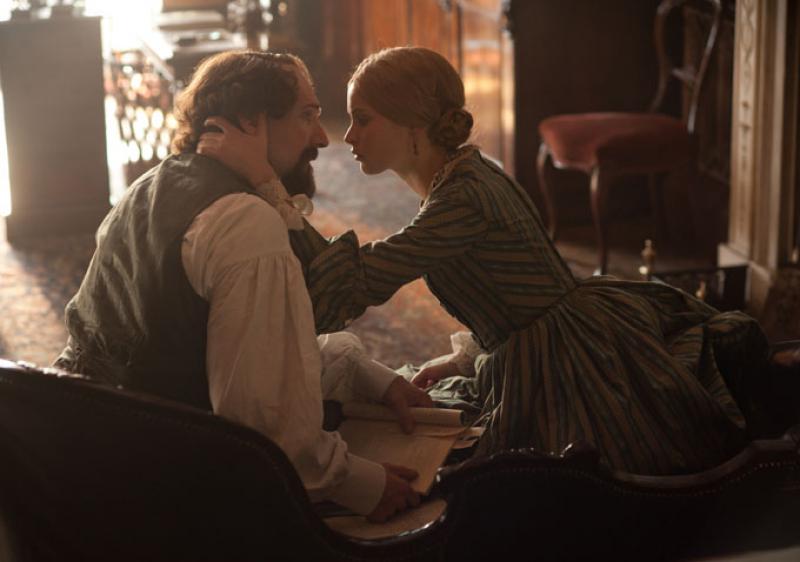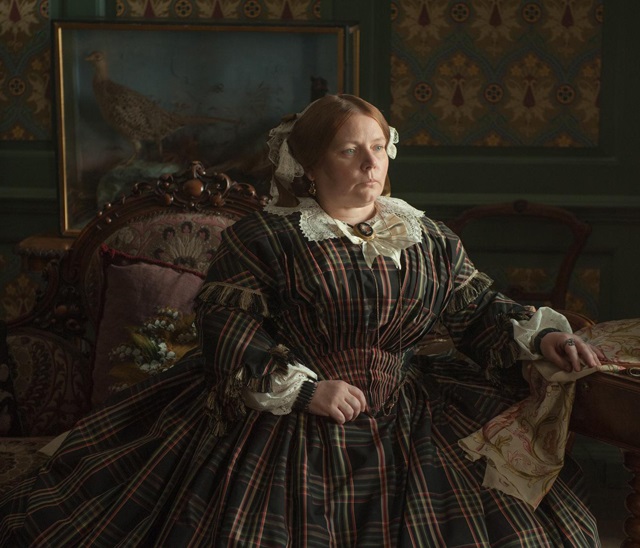The Invisible Woman | reviews, news & interviews
The Invisible Woman
The Invisible Woman
Ralph Fiennes's second directorial outing reveals the secret lover of Charles Dickens

Delve into the personal life of Charles Dickens and she emerges, revealing another side of an author whose stories seem so wholesome. According to The Invisible Woman author Claire Tomalin, Ralph Fiennes’ film about Charles Dickens’ secret mistress is very different from the book upon which it is based.
Ellen Lawless Ternan (Felicity Jones) lived from 1839 to 1914, yet almost sunk without trace. She is mentioned in Dickens’s diary with an initial "N". Once Nelly married, she existed as a wife thereafter. One of three Ternan actress daughters (the others are played by Perdita Weeks and Amanda Hale) aided by a widowed mother (Kristin Scott Thomas), Nelly caught the very married, very fertile author’s eye and, eventually, heart. Like almost all married men, Dickens never divorced his wife Catherine (Joanna Scanlan, pictured below, who gives a searing, understated performance), keeping Nelly hidden, financially reliant while also helping him with his work. The film relates their meeting and secret life together. The ending, memorably handled, is perhaps the film's most spectacular scene in a procession of subtleties.
 Shown as more charmer than cad, Dickens here is, at best, brilliant, witty and, at least superficially, initially caring. At worst, he is weak – an emotional coward unable to honour his lover, giving preferential treatment to his family and career. He is egotistical and insecure – a cake-and-eat-it type. As the vicar points out early in the film, any man who writes about life as vividly as Dickens must have lived quite a lot of it. Despite appearances, Dickens is not such a nice guy.
Shown as more charmer than cad, Dickens here is, at best, brilliant, witty and, at least superficially, initially caring. At worst, he is weak – an emotional coward unable to honour his lover, giving preferential treatment to his family and career. He is egotistical and insecure – a cake-and-eat-it type. As the vicar points out early in the film, any man who writes about life as vividly as Dickens must have lived quite a lot of it. Despite appearances, Dickens is not such a nice guy.
For his second feature after the successful Coriolanus, Fiennes was only going to direct The Invisible Woman. Given his resemblance to Dickens, it's a wise move to play him too. Fiennes, Jones and Scanlan give exceptional performances, as Dickens, Nelly and the vastly wise Mrs Dickens respectively. Kristin Scott Thomas, Tom Hollander, Tom Burke and Michelle Fairley give the film a lot of backbone: Wilkie Collins, Dicken’s eldest son Charley, Mrs Ternan and her daughters need the best actors to bring them to life. Supported by stunning period locations, sets, wardrobe, hair and makeup, The Invisible Woman ticks along at an easy-to-follow pace. Rob Hardy's cinematography, however, seems lit by fatty candlelight, giving the film the patina of an uncleaned painting. Overall, however, The Invisible Woman is a memorable, beautiful story of love that exalts and dismays us.
The future of Arts Journalism
You can stop theartsdesk.com closing!
We urgently need financing to survive. Our fundraising drive has thus far raised £49,000 but we need to reach £100,000 or we will be forced to close. Please contribute here: https://gofund.me/c3f6033d
And if you can forward this information to anyone who might assist, we’d be grateful.

Subscribe to theartsdesk.com
Thank you for continuing to read our work on theartsdesk.com. For unlimited access to every article in its entirety, including our archive of more than 15,000 pieces, we're asking for £5 per month or £40 per year. We feel it's a very good deal, and hope you do too.
To take a subscription now simply click here.
And if you're looking for that extra gift for a friend or family member, why not treat them to a theartsdesk.com gift subscription?
more Film
 Blu-ray: Darling
John Schlesinger's Sixties classic now feels problematic, but retains an icky fascination
Blu-ray: Darling
John Schlesinger's Sixties classic now feels problematic, but retains an icky fascination
 Tornado review - samurai swordswoman takes Scotland by storm
East meets West meets North of the Border in a wintry 18th-century actioner
Tornado review - samurai swordswoman takes Scotland by storm
East meets West meets North of the Border in a wintry 18th-century actioner
 Lollipop review - a family torn apart
Posy Sterling brilliantly conveys the torment of a homeless single mother denied her kids
Lollipop review - a family torn apart
Posy Sterling brilliantly conveys the torment of a homeless single mother denied her kids
 Big Star: The Nick Skelton Story review - the ways of a man with his mount
Documentary about the champion showjumping duo
Big Star: The Nick Skelton Story review - the ways of a man with his mount
Documentary about the champion showjumping duo
 Ballerina review - hollow point
Ana de Armas joins the Wick-verse to frenetic but soulless effect
Ballerina review - hollow point
Ana de Armas joins the Wick-verse to frenetic but soulless effect
 Blu-ray: Eclipse
The BFI has unearthed an unsettling 1977 thriller starring Tom Conti and Gay Hamilton
Blu-ray: Eclipse
The BFI has unearthed an unsettling 1977 thriller starring Tom Conti and Gay Hamilton
 The Ballad of Wallis Island review - the healing power of the old songs
Estranged folk duo reunites in a classy British comedy drama
The Ballad of Wallis Island review - the healing power of the old songs
Estranged folk duo reunites in a classy British comedy drama
 The Salt Path review - the transformative power of nature
Marianne Elliott brings Raynor Winn's memoir to the big screen
The Salt Path review - the transformative power of nature
Marianne Elliott brings Raynor Winn's memoir to the big screen
 Bogancloch review - every frame a work of art
Living off grid might be the meaning of happiness
Bogancloch review - every frame a work of art
Living off grid might be the meaning of happiness
 When the Light Breaks review - only lovers left alive
Tender close-up on young love, grief and growing-up in Iceland
When the Light Breaks review - only lovers left alive
Tender close-up on young love, grief and growing-up in Iceland

Add comment